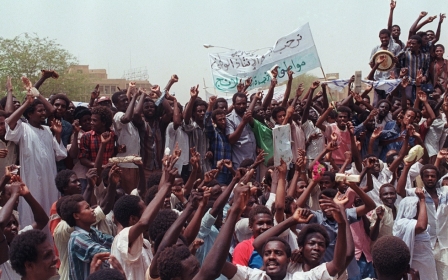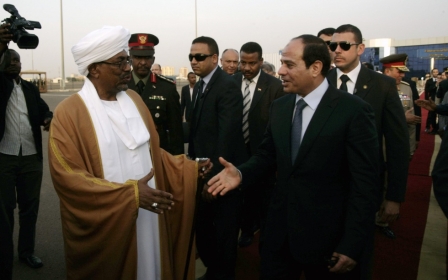Sudanese forces bombed civilian hospital to 'terrorise' locals: NGO

Sudanese air force planes directly targeted a hospital run by Medecins Sans Frontieres (MSF) earlier this week, injuring two people, the group has said.
A fighter jet bearing the markings of the Sudanese air forces dropped a cluster of 13 bombs, two of which landed inside the hospital compound in South Kordofan, MSF said in a statement on Friday.
Planes flew at low altitude over the compound at 14:00 local time on Tuesday, when around 150 people were in the hospital.
One patient and an MSF staffer were injured in the attack, which also caused significant material damage to the hospital building.
“It was lucky that there were not more human casualties,” according to Gwenola Francois, a senior researcher with the medical aid charity.
“There was absolutely no warning – all that staff and patients could do to protect themselves was to get down on the ground."
The group believes the bombing raid, which also hit a church six kilometres from the field hospital, deliberately targeted the two sites.
“Authorities in Khartoum knew the location of the hospital – it is in a civilian area,” Francois said.
The hospital is in the rebel-held village of Frandala, and MSF suspects the raid was an attempt to intimidate the local population.
“There can be no doubt that this was a deliberate and targeted bombing of a civilian hospital structure, and part of a strategy to terrorise the community,” MSF head of mission Marc Van der Mullen said in a statement.
The United Nations has expressed “deep concern” over the reported attack.
The targeting of medical facilities is a “serious violation of…international humanitarian law,” the UN’s Office for the Co-ordination of Humanitarian Affairs said in a statement.
The body called on all parties in the conflict to “respect their obligations…in relation to the protection of civilians”.
A spokesperson for the Sudanese military was unavailable for comment at the time of publication.
South Kordofan, an impoverished mainly desert state in Sudan’s far south, has been racked by conflict for decades.
Lying on the border between Sudan and South Sudan, the state has frequently been targeted by Khartoum’s military because of support from some residents for southerners during their decades-long independence struggle.
South Kordofan became the country’s only source of oil after the secession of the oil-rich south in 2011.
Despite an earlier historic visit to the area by Sudan's President Omar al-Bashir, fighting in the area intensified last May as the government launched its “Decisive Summer” military campaign.
The surge aimed to root out fighters from the Sudan People’s Liberation Movement – North (SPLM-N), an armed movement active in the area.
However, the campaign was ineffective and on Wednesday SPLM-N announced that they had captured a Sudanese army outpost, causing troops to escape to neighbouring villages.
The fighting has led huge numbers of people to flee their homes – some are forced to seek refuge over the border in war-torn South Sudan.
Tuesday’s attack on the MSF hospital in Frandala village is the second time it has been hit.
An earlier bombing of the same facility last June killed one patient at the hospital, sparking a storm of international outrage.
After Tuesday’s attack, the hospital remains closed, and staff fear that the deteriorating security situation will make it impossible to carry out ever-more vital work.
“People are really scared,” Francois said. “We have to think about how to offer them psychological support after the violence.
“We don’t know how to help people in the area. We want to continue supporting them but the level of insecurity has become unacceptable."
Stay informed with MEE's newsletters
Sign up to get the latest alerts, insights and analysis, starting with Turkey Unpacked
Middle East Eye delivers independent and unrivalled coverage and analysis of the Middle East, North Africa and beyond. To learn more about republishing this content and the associated fees, please fill out this form. More about MEE can be found here.




